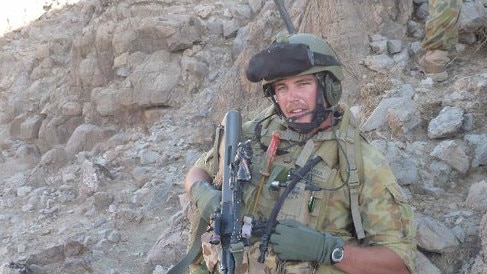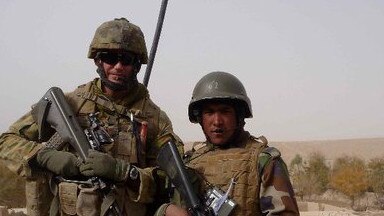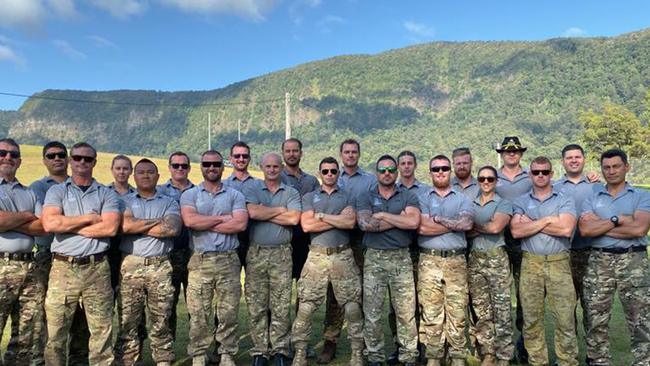How Afghan vet went from booze and drugs to $4m success
When Troy Methorst left the army after barely escaping with his life in Afghanistan, he descended into a self-destructive cycle of drinking and drugs. He now runs a million-dollar business.

City Beat
Don't miss out on the headlines from City Beat. Followed categories will be added to My News.
When Troy Methorst left the army after barely escaping with his life in Afghanistan, he descended into a self-destructive cycle of drinking and drugs.
His bruising military career that had seen him survive fire fights with bands of Taliban and the grief of losing close mates in battle left him a broken man.
“I basically lost the drive for life,” the 36-year-old recalls. A decade later, Gold Coast-based Methorst and a group of army mates now run a $4m a year
business called Veteran Mentors, using the soldiering forged in the heat of battle to help young people improve their self-confidence and life skills.
So far more than 2000 young people aged between 12 and 17 have attended the boot camp style adventure camps run by the company, with plans to expand the program into Singapore and Western Australia. Methorst, who followed his Vietnam Veteran father into the army at the age of 18, always wanted to pursue a military career. “I remember my mum did not want me to join the infantry because it was too dangerous,” says Methorst.
Methorst served briefly in East Timor before being shipped out to Afghanistan in 2010 where his unit had the job of locating and disarming improvised explosive devices (IEDs) as well as training the local Afghan army.
“Sometimes we would blow the IED’s up or we would dismantle them by hand to obtain vital forensic evidence including fingerprints,” he says. Methorst says the Taliban were not particularly well trained, but they were cunning and knew when to attack.

He came close to losing his life on one particular occasion when pinned down by machine gun fire as his unit retreated. “I thought this was it - I am going to die,” he says. “A bullet grazed my knuckle but I escaped. I often wondered why I had survived. Maybe it was divine intervention.” Methorst says he lost confidence in the army command when a mate lost his life trying to defuse an IED, a situation he believed could have been avoided.
He came back to Australia and attempted to start a new life, but quickly descended into an unhealthy lifestyle of alcohol and drugs.
“I started doing what I thought was best, which was to party - drinking, drugs you name it,” he says. “I didn’t understand at the time but I was masking all my Post Traumatic Stress Disorder symptoms and since I was already on the way out no one cared what I was doing.”
At one stage, Methorst toyed with the idea of joining the SAS but withdrew after passing the required tests. “I was good at soldiering, but just did not want to go back to the army,’” he says. It was on the flight back from SAS induction that he had the inspiration about starting Veteran Mentors. He had enjoyed training and mentoring the local troops in Afghanistan and believed the basic training model could be applied to young people.
“I received a small compensation payout from Veterans Affairs and I knew I wanted to do something not just blow it on drugs and partying,” he says.
In 2017, Methorst and fellow veterans Matthew French, Glenn Filtness and Ricky Smith each decided to invest $15,000 to start Veteran Mentors. “We all gelled really well and each one of us had a passion for helping youth,” says Methorst.

Every Veteran Mentors camp, which are run in Queensland and NSW, is based on the military principles of break down the man before building him up. Much like basic training, there are compulsory uniforms, marches and hikes.
“We don’t allow any phones or computers,” he says. Later there are confidence building sessions around the camp fire where young people are encouraged to talk about their lives and challenges. The camp ends on a literal high note with a tandem parachute jump.
Methorst says Veterans Mentors has saved and rebuilt many lives. “Some kids have come back as mentors,” he says. “The other day we received an email from a young guy who had completed the program three or four times. He had been had through the courts but had pulled himself together, had finished school, got a job and was playing sport.”
ENGINEERS’ NIGHT OF NIGHTS
They may not be the Academy Awards but the people who build out road, bridges and other key infrastructure had their nightof nights in Cairns this week.
The Kingsford Smith Drive upgrade, Brisbane City Council’s speed monitors and the Mill at Petrie were among the projects to receive gongs at the Institute of Public Works Engineering Australasia Queensland (IPWEAQ) awards night.
IPWEAQ chief executive Leigh Cunningham said infrastructure projects would contribute an estimated $32bn annually to the Queensland economy over the next five years.
“With the state’s continuing growth and the lead up to the 2032 Olympics, public works engineering will be at the fore frontover the coming decade,” said Ms Cunningham.
The Kingsford Smith Drive upgrade had transformed one of the city’s busiest and most historically significant routes into a vibrant corridor with the Brisbane River as its centrepiece.
The upgrade had created a six-lane median-divided roadway that had
reduced traffic congestion and improved local amenity and access for road users including cyclists, pedestrians and public transport commuters. A key feature of the upgrade is the subtropical tree-line boulevard that created a new entry statement for the city.
Brisbane City Council’s Speed Awareness Monitors (SAMs) for Schools project received an excellence award for road safety infrastructure.The monitors reward motorists with a smiley face for driving at or below the speed limit and a slowdown message when they are speeding.
SAMs has encouraged motorists to reduce speed by an average of more than eight kilometres per hour across all sites since it was introduced in 2013. There are currently over 180 monitors in place across Brisbane.
Moreton Bay Regional Council took out the best project worth from $5 million to $10 million for The Mill at the Moreton Baywater park and play space on the former Petrie Paper Mill site. The Mill playground features custom designed adventure and water play spaces which reflect the historic industrial nature of the site.





